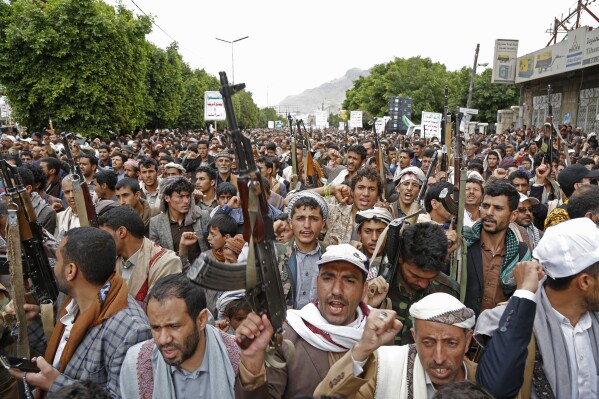US, British militaries team up again to bomb sites in Yemen used by Iran-backed Houthis
WASHINGTON (AP) — The U.S. and British militaries bombed multiple sites used by the Iranian-backed Houthis in Yemen on Monday night, the second time the two allies have conducted coordinated retaliatory strikes on an array of the rebels’ missile-launching capabilities, several U.S. officials said.
According to officials, the U.S. and U.K. used warship- and submarine-launched Tomahawk missiles and fighter jets to take out Houthi missile storage sites and launchers. The officials spoke on condition of anonymity to discuss an ongoing mission.
The joint operation comes about 10 days after U.S. and British warships and fighter jets struck more than 60 targets in 28 locations. That what was the first U.S. military response to what has been a persistent campaign of Houthi drone and missile attacks on commercial ships since the start of the Israel-Hamas war in October.
The Houthis’ media office said in an online statement that several American and British raids targeted Yemen’s capital, Sanaa. And Jamal Hassan, a resident from south Sanaa, told The Associated Press that two strikes landed near his home, setting off car alarms in the street. An Associated Press journalist in Sanaa also heard aircraft flying above the skies of Sanaa overnight Monday.



The latest barrage of allied attacks follows an almost-daily assault on Houthi missile launchers by U.S. fighter jets and ship-based Tomahawks over the past week. The rapid response missions, which officials said go after launchers that are armed and ready to fire, demonstrate the military’s increasing ability to watch, detect and strike militant activities in Yemen.
The chaotic wave of attacks and reprisals involving the United States, its allies and foes suggests that the retaliatory strikes haven’t deterred the Houthis from their campaign against Red Sea shipping, and that the broader regional war that the U.S. has spent months trying to avoid is becoming closer to reality.
For months, the Houthis have attacked ships in the region’s waterways that they say are either linked to Israel or heading to Israeli ports. They say their attacks aim to end the Israeli air-and-ground offensive in the Gaza Strip that was triggered by the Palestinian militant group Hamas’ Oct. 7 attack in southern Israel. But any such links to the ships targeted in the rebel assaults have grown more tenuous as the attacks continue.
___
Associated Press writers Jack Jeffery in London and Ahmed al-Haj in Sanaa contributed to this report.
Disclaimer: The copyright of this article belongs to the original author. Reposting this article is solely for the purpose of information dissemination and does not constitute any investment advice. If there is any infringement, please contact us immediately. We will make corrections or deletions as necessary. Thank you.




